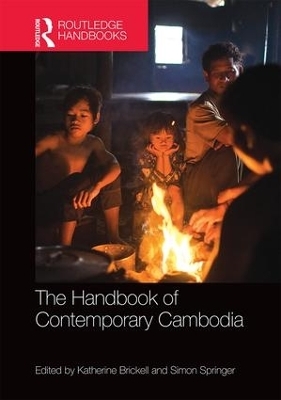
The Handbook of Contemporary Cambodia
Routledge (Verlag)
978-1-138-83118-6 (ISBN)
Political and Economic Tensions
Rural Developments
Urban Conflicts
Social Processes
Cultural Currents
The first section looks at the major political implications and tensions that have occurred in Cambodia, as well as the changing parameters of its economic profile. The handbook then highlights the major developments that are unfolding within the rural sphere, before moving on to consider how cities in Cambodia, and particularly Phnom Penh, have become primary sites of change. The fourth section covers the major processes that have shaped social understandings of the country, and how Cambodians have come to understand themselves in relation to each other and the outside world. Section five analyses the cultural dimensions of Cambodia’s current experience, and how identity comes into contact with and responds to other cultural themes.
Bringing together a team of leading scholars on Cambodia, the handbook presents an understanding of how sociocultural and political economic processes in the country have evolved. It is a cutting edge and interdisciplinary resource for scholars and students of Southeast Asian Studies, as well as policymakers, sociologists and political scientists with an interest in contemporary Cambodia.
Katherine Brickell is Reader in Human Geography at Royal Holloway, University of London, UK, and recipient of the 2014 Royal Geographical Society Gill Memorial Award. For over a decade, her research has focused on gender, violence and rights in Cambodia. Simon Springer is Associate Professor of Geography at the University of Victoria, Canada and recipient of the 2015 Association of American Geographers Stanley D. Brunn Young Scholar Award. He has authored four books, including Cambodia’s Neoliberal Order (Routledge, 2012).
Introduction to contemporary Cambodia
Part 1: Political and economic tensions
1. The contemporary geopolitics of Cambodia: Alignments in regional and global contexts
2. Justice inverted: Law and human rights in
3. Justice and the past: The Khmer Rouge tribunal
4. Civil society in Cambodia: Challenges and contestation
5. Micro-saturated: The promises and pitfalls of microcredit as a development solution
6. The media in Cambodia
7. Tourism in Cambodia: Opportunities and challenges
Part 2: Rural developments
8. Exploring rural livelihoods through the lens of coastal fishers
9. Practices and challenges towards sustainability
10. The imperative of good water governance in Cambodia
11. Cambodia’s highlanders: Land, livelihoods and the politics of indigeneity
12. Under pressure: Environmental risk and contemporary resilience strategies in rural Cambodia
13. Concessions in Cambodia: Governing profits, extending state power and enclosing resources from the colonial era to the present
14. From chicken wing receipts to students in military uniforms: Land titling and property in post-conflict Cambodia
Part 3: Urban conflicts
15. Urban megaprojects and city planning in Phnom Penh
16. Labor rights and unions in Cambodia
17. The ties that bind: Rural-urban linkages in the Cambodian migration system
18. Real estate productions, practices, and strategies in contemporary Phnom Penh: An overview of social, economic, and political issues
19. Forced relocation in Cambodia
20. Homelessness in Cambodia: The terror of gentrification
21. Phnom Penh’s relocation sites and the obliteration of politics
22. Street vending in Phnom Penh: Flourishing but invisible
Part 4: Social processes
23. The contemporary landscape of education in Cambodia: Hybrid spaces of the "public" and "private"
24. Health: medical cosmologies and medical inequities
25. Violence against women and girls in Cambodia
26. Gendered politics of power in contemporary Cambodia
27. Sex politics and moral panics: LGBT communities, sex/entertainment works and sexually- active youth in Cambodia
28. Children, childhood and youth in contemporary Cambodia
29. Households and family processes
30. Digital technologies in contemporary Cambodia
Part 5: Cultural currents
31. Ethnic identities in Cambodia
32. Violence and memorialization in Cambodia
33. A shifting universe – religion and moral order in Cambodia
34. The persistent presence of Cambodian spirits: Contemporary knowledge production in Cambodia
35. Natural and cultural heritage in Cambodia
36. Destination Cambodia: A volunteer tourism boom
37. Addressing the contemporary: Recent trends and debates in Cambodian visual art
38. Finding new ground: Maintaining and transforming traditional music
| Erscheinungsdatum | 24.05.2016 |
|---|---|
| Zusatzinfo | 12 Tables, black and white; 6 Line drawings, black and white; 7 Halftones, black and white; 13 Illustrations, black and white |
| Verlagsort | London |
| Sprache | englisch |
| Maße | 174 x 246 mm |
| Gewicht | 975 g |
| Themenwelt | Schulbuch / Wörterbuch ► Lexikon / Chroniken |
| Geisteswissenschaften ► Geschichte ► Regional- / Ländergeschichte | |
| Naturwissenschaften ► Geowissenschaften ► Geografie / Kartografie | |
| Sozialwissenschaften ► Ethnologie ► Volkskunde | |
| Sozialwissenschaften ► Politik / Verwaltung | |
| Sozialwissenschaften ► Soziologie ► Spezielle Soziologien | |
| ISBN-10 | 1-138-83118-2 / 1138831182 |
| ISBN-13 | 978-1-138-83118-6 / 9781138831186 |
| Zustand | Neuware |
| Haben Sie eine Frage zum Produkt? |
aus dem Bereich


